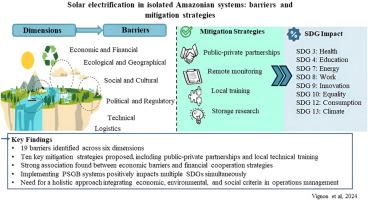Solar electrification in isolated Amazonian systems: Barriers and mitigation strategies
IF 16.3
1区 工程技术
Q1 ENERGY & FUELS
引用次数: 0
Abstract
The Amazon region faces significant challenges in accessing electricity in isolated systems. Solar photovoltaic energy with batteries is a promising alternative that aligns with the Sustainable Development Goals. However, its implementation is hindered by complex barriers. Previous studies have addressed specific aspects, but there is a need for a comprehensive analysis that identifies barriers and strategies considering multiple dimensions and their relation to the SDGs. Through a systematic literature review, this article aims to identify and analyse the main barriers and strategies for developing solar photovoltaic energy with batteries in isolated Amazonian systems. Thirty-two articles were analysed, identifying 19 barriers across six dimensions and ten mitigation strategies. Simple Correspondence Analysis was used to investigate the relationship between barriers and strategies. A conceptual framework was proposed to link barriers, strategies, and SDGs. The results highlight the complexity of the challenge, requiring a holistic approach aligned with the SDGs and integrating sustainability criteria into operational management. The study provides significant implications for public policies and private initiatives, promoting sustainable energy solutions adapted to local Amazonian realities. It also offers guidelines for effectively implementing strategies and contributes to advancing knowledge in renewable energy for isolated regions.

孤立的亚马逊系统中的太阳能电气化:障碍与缓解策略
亚马逊地区面临着在孤立系统中获取电力的巨大挑战。带电池的太阳能光伏发电是一种很有前景的替代能源,符合可持续发展目标。然而,复杂的障碍阻碍了它的实施。以往的研究涉及了一些具体方面,但还需要进行全面分析,从多个维度及其与可持续发展目标的关系来确定障碍和战略。本文通过系统的文献综述,旨在确定和分析在亚马逊孤立系统中开发带电池的太阳能光伏发电的主要障碍和策略。文章分析了 32 篇文章,确定了 19 个障碍,涉及 6 个方面和 10 个缓解策略。采用简单对应分析法研究了障碍与策略之间的关系。提出了一个概念框架,将障碍、战略和可持续发展目标联系起来。研究结果凸显了这一挑战的复杂性,需要采取与可持续发展目标相一致的整体方法,并将可持续发展标准纳入运营管理。这项研究为公共政策和私人倡议提供了重要影响,促进了适应亚马逊当地现实的可持续能源解决方案。它还为有效实施战略提供了指导方针,并有助于推动偏远地区可再生能源知识的发展。
本文章由计算机程序翻译,如有差异,请以英文原文为准。
求助全文
约1分钟内获得全文
求助全文
来源期刊

Renewable and Sustainable Energy Reviews
工程技术-能源与燃料
CiteScore
31.20
自引率
5.70%
发文量
1055
审稿时长
62 days
期刊介绍:
The mission of Renewable and Sustainable Energy Reviews is to disseminate the most compelling and pertinent critical insights in renewable and sustainable energy, fostering collaboration among the research community, private sector, and policy and decision makers. The journal aims to exchange challenges, solutions, innovative concepts, and technologies, contributing to sustainable development, the transition to a low-carbon future, and the attainment of emissions targets outlined by the United Nations Framework Convention on Climate Change.
Renewable and Sustainable Energy Reviews publishes a diverse range of content, including review papers, original research, case studies, and analyses of new technologies, all featuring a substantial review component such as critique, comparison, or analysis. Introducing a distinctive paper type, Expert Insights, the journal presents commissioned mini-reviews authored by field leaders, addressing topics of significant interest. Case studies undergo consideration only if they showcase the work's applicability to other regions or contribute valuable insights to the broader field of renewable and sustainable energy. Notably, a bibliographic or literature review lacking critical analysis is deemed unsuitable for publication.
 求助内容:
求助内容: 应助结果提醒方式:
应助结果提醒方式:


